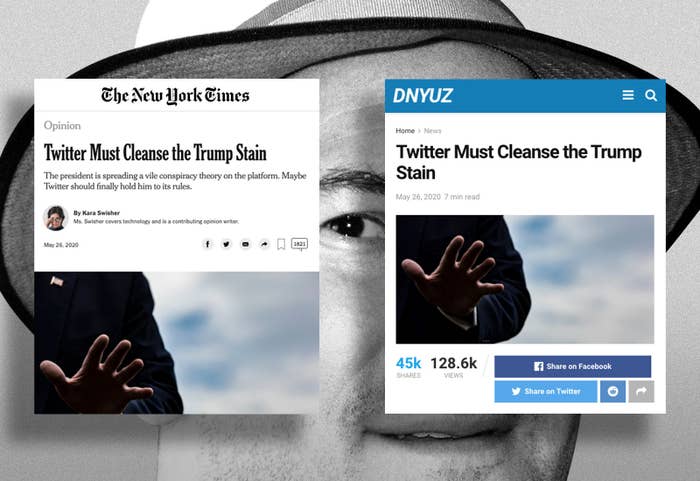
On Tuesday, New York Times columnist Kara Swisher revealed that a widower sent a personal letter to Twitter CEO Jack Dorsey asking him to delete tweets from President Donald Trump about the man’s late wife. Trump had falsely implied that MSNBC host Joe Scarborough was involved in the death of the woman, who worked in his office when he was a member of Congress.
The Drudge Report, the venerable website run by Matt Drudge, soon featured the story.
But Drudge didn’t link to the New York Times. Instead, the site sent visitors to a copy-pasted version of the story on dnyuz.com, an obscure site filled with content plagiarized from publishers, including the Times, the Atlantic, Bloomberg, and the Financial Times, among others.
Since November, the links on the Drudge Report have sent roughly 8 million pageviews to the site, according to data from analytics service SimilarWeb. This has likely earned significant revenue for its owner, who has taken steps to hide their identity. The success of dnyuz.com is yet another example of how Google, which provides the ads that make the site's money, allows webpages that copy content from real publishers to reap ad dollars. At the same time, the news industry is hemorrhaging jobs and revenue.
A post on May 24 on the scammer-tracking site hucksters.net identified the site's owner as Hayk Karapetyan, a web developer living in Armenia. BuzzFeed News came to the same conclusion based on domain registration records, Domain Name System data, and dnyuz.com's use of the same Google AdSense ID number as other sites currently or previously owned by Karapetyan.
Neither Karapetyan nor Matt Drudge responded to requests for comment.
A Google spokesperson said it removed ads from dnyuz.com and terminated the associated AdSense publisher account after being contacted by BuzzFeed News.
“We have strict policies that govern what kind of content we place ads on and specifically prohibit content that is copied from other websites without adding any original value from monetizing,” the spokesperson said. “If we find a page or website that violates our policies, we take immediate action. In this instance, we’ve removed all Google Ads from the site.”
Domain records show that Karapetyan previously owned sites that republished articles from English-language outlets, including usnewz.com, newsfcanada.com, and uknewsy.com. These sites are no longer active, but he currently operates a1.am, an Armenian travel guide that used to be a news aggregator, and a related web design business.

The Drudge Report began linking to dnyuz.com as early as November 2019, according to data from SEMRush, a search analytics tool. The links have been a consistent presence on the site since. On April 30 and May 1, the Drudge Report linked to at least six articles on dnyuz.com that were plagiarized from the New York Times: a story about food banks, a column about Tara Reade, a look at tenants' issues during the pandemic, a story about Trump officials pushing for intelligence about the virus that paints China in a bad light, a story about Trump’s lack of grieving for COVID-19 victims, and a look at lockdowns in upstate New York.
Those stories received more than 300,000 views on dnyuz.com, according to stats listed on the articles’ pages. The biggest dnyuz.com hit appears to have been a plagiarized New York Times story about murder hornets, which Drudge linked to on May 2 and has received close to 500,000 views.
The Google spokesperson said the company's investigation did not identify any connections between the Drudge Report and dnyuz.com. BuzzFeed News also found no evidence that Drudge and Karapetyan are working together — or even know each other.
In his post about dnyuz.com, Jesse Nickles, the web developer who runs hucksters.net, said he thought that to avoid sending readers to paywalls, the Drudge Report often linked to versions of articles on sites that licensed the original story.
"In contrast, DNyuz appears to be merely scraping (copying) thousands of articles from hundreds of different original publishers, stripping out all bylines and photo credits, and then embedding his own advertising scripts into the pages,” Nickles told BuzzFeed News.
Last year, the Drudge Report left its longtime advertising partner, Intermarkets, for a newly formed company called Granite Cubed, which now calls itself Voranda. A company representative did not respond to a request for comment.
